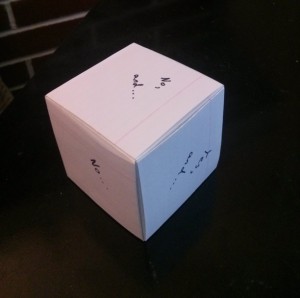I’ve added a central games page https://za3k.com/mygames.md to my website, with all the games I designed. The new games:
Loot Boxes. Untested. Easy storytelling game for 2-4 players. The players have an inventory of absurd random items, and must solve challenges using each item in turn.
Stupid Russia. Tested. Party game for 10+ people. Each player is a spy director at the Stupid KGB, and must report as many codenames to the Inspector as possible, swapping secret information with other players. The players had fun, especially adopting bad accents. The rules were too hard to understand, and it was too much work and no fun for me as the Inspector. Overall I’d just recommend Stupid Conspiracies instead.
Stupid Conspiracies. Untested. Party Game for 8+ people. Each player tries to recruit the others into their conspiracy, for about half an hour. It’s a re-write of the core idea in Stupid Russia. Overall, big party games are just too hard for me to organize.
I also playtested “No this cannot be! I AM INVINCIBLE!”. It ran about 45 minutes prep (not fun) and 45 minutes playtime, which was the main problem. Overall the play time was fun. I rewrote it to have MUCH easier prep, and for the game to be generally easier. I also re-wrote the rules of “Ninjas Ninjas Ninjas” without a playtest. I don’t think it will ever be too popular but it has a soft spot for me.

